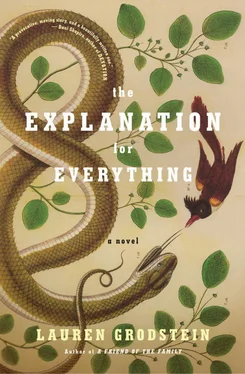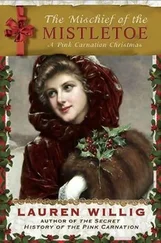“Did you stay?”
“All afternoon,” she said. “I kept trying to leave, but I just wasn’t able to.”
“Why not?”
“Oh, I don’t know. Real-estate dreams,” she said. “The dreams of a different life. I kept decorating the rooms in my head. Picking out furniture I remembered from catalogs, a Pottery Barn sofa. All the family pictures were mine, though. The ones I imagined hanging on the walls.”
“Real-estate dreams, huh?”
“Houses are symbols, aren’t they?” she said, philosophizing. “You look at a house—or at least I look at a house—and if it’s nice then I imagine the family who lives there is also very nice, very responsible. Earned that house somehow. Unless it’s big and tacky, in which case I imagine the people who live in it are just horrible.” She laughed. “I remember when we bought our house, I wondered what people would think, if they would think I was nice and responsible or just tacky. It’s such a big house! But I loved it. I wanted to live in it forever. I remember driving past it when I was a kid and thinking someday I’ll live there. I couldn’t believe it when we moved in.”
She sighed, looked at her hands. It was dark like midnight outside, only the occasional streetlight puncturing the black. “It’s a good thing I didn’t grow up in Lace Point, otherwise who knows what I would have dreamed of.”
“So when did you finally leave?”
“I had to pick up Jeremy,” she said. “And I remember thinking, I’ll pick him up and I’ll bring him right back here, we’ll feed the swans, we’ll hang up our pictures on the wall, we’ll make this ours.” She laughed. “Desire can make you a little crazy.”
She looked at him as if she wanted to say something, but then changed her mind. “Is your colleague’s house like that?”
“What, like a castle?” Andy said. “No,” he said, remembering what he could of his colleague’s home. “It’s nice, but you’ll be able to leave.”
Still, Sheila seemed to grow more abashed as they traversed Marty’s flagstone pathway. Marty’s wife, Jane, came from wealth, and the house exuded quiet but smug good taste. Three stories, brick. A slate roof with copper gutters. Attractive outdoor landscaping, attractively lit, and a circular drive crowded with his colleagues’ cars. Automatic lights beamed on them as they parked, illuminating some Japanese plantings to the side of the house, stunted trees and a miniature pagoda.
“You said this wasn’t too fancy?”
“Just relax,” Andy said, holding Sheila’s wine.
They were welcomed in enthusiastically, the last to arrive, and the women in the department told Sheila how happy they were Andy had finally brought someone while Marty offered Andy a scotch. Andy rarely drank—it was a way to keep his discomfort with drinking at bay, simply never to do it—but he found that not drinking at Marty’s made him more uncomfortable than accepting what was poured, so he took the scotch, sniffed it, made some idle chitchat from the comfort of one of Marty’s leather club chairs, near the warmth of the roaring fire, while Sheila was fussed over in the kitchen.
“So, how’s your semester been?” asked George Hayad, the department’s polyester-clad microbiologist. “Still teaching your God class?”
“Just finished up.”
“Decent students?” George asked, then coughed up something thick and wiped it into a handkerchief. “You get any loonies this time?”
“Not really,” Andy said, thinking of Melissa, of Lionel Shell. “Mostly nice kids. Open-minded.”
“Open-minded or just uninvested?” Marty asked. “I don’t know which is worse, actually—kids who disagree with evolution or kids who just don’t care.”
“They care,” Andy said. “But they care about a lot of other things too. They’re busy kids.”
“Please,” Marty said, looking around his cherry-paneled living room, the oil paintings of hunting dogs on the walls. “What do they do? Listen, I worked three jobs to get my ass through Yale. I stocked groceries at night. You think any of these kids do that?”
“Some of them might.”
“They drive nicer cars than I do,” Marty said, which was certainly true for some of them, but Andy had always suspected that Marty drove his rusty Ford just so that he could point out that his students drove nicer cars than he did.
“We have a lot of kids on financial aid. Two thirds of them, I think.”
“I don’t know,” Marty said, shaking his head dolefully. “I look at the student parking lot, it’s full of Audis. You know how much I’d like an Audi?”
“So buy yourself an Audi,” said George Hayad.
“Jane would never let me. Jane doesn’t like German cars.”
“Ah,” George said, and the three men stared into their scotch, then at each other, trying to determine what to say next.
“So I’ve been trying to finish up an Advancing Theory of Biology grant for the NSF,” Andy said, as the grant was his conversational Audi, impressing his colleagues into hushed submission. “I’m thinking we could really upgrade our lab equipment with the funding, maybe even hire a postdoc or two.”
“Federal funding is impossible now,” George said.
“You think we need a postdoc?” Marty smiled, unimpressed. Andy had overplayed his hand. “For what, may I ask?”
“Well,” Andy said, “my research is complicated.”
“Ah,” Marty said. “You still doing whatever it is with the mice?”
“He cuts off their heads. It’s like an abattoir down there.” George pronounced abattoir with a French accent.
“That’s how animal research gets done,” said Marty. “Don’t be a philistine.” But he and George laughed together for quite some time, leaving Andy to stare into his scotch.
“Well,” said Marty, after a few minutes of fraternal chuckling, “here come the ladies. Is it time to eat?”
“Mmm,” said George. “Smells like roast.”
Over dinner, Sheila was quiet and deferential. She mentioned twice that she was just a dental hygienist, had never even gone to college, and that she had never sat around at a table with so many doctors before. At this, Andy wanted to say that they weren’t actually doctors, that none of them could cure cancer or even prescribe a Valium, but of course one was never supposed to say that to a PhD, even if you yourself had a PhD, and also Andy had somehow forgotten how much people drank at these parties. (Had he forgotten? Or had he just not felt like remembering?) He himself was drinking more than usual, had already put down a glass and a half of red by the time the soup was cleared, plus the scotch.
“So Sheila, tell us, do you ever see any really gory teeth?” asked Nina Graff, whose own teeth were stained wine red. “Like just disgusting mouthfuls you cannot believe ?”
“Oh man, I could tell you stories.”
Please, thought Andy, don’t.
But Sheila was suddenly in her element; she launched into detailed accounts of the various malocclusions and enamel rot she encountered day to day, unaware she was being humored (was she being humored?) while the biology department sliced and swallowed their tenderloin. And then, soon enough, it was time for cake—“puds,” said George, who had studied eight million years ago at Cambridge—and then it would be over, and Andy could go home to his girls, his little house.
“And toddlers are the worst. Parents putting juice in their kids’ bottles.”
“Really?” Nina said, putting down her glass. “I don’t believe you. Who would do such a thing? Who would do that?”
“It’s true. And not just poor kids, either. Educated parents give their kids milk all day, not knowing milk has sugars that rot kids’ teeth. I’ve seen two-year-olds who need their entire mouths replaced.”
Читать дальше












